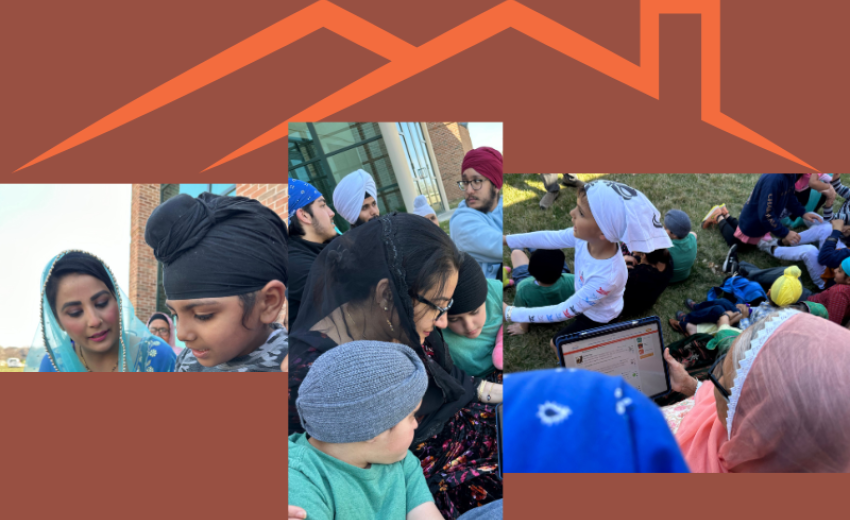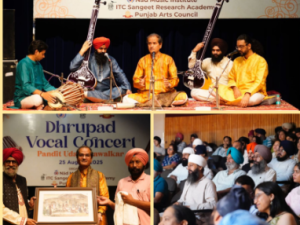“Working Towards Wellness” Resources for Victim-Survivors of Domestic Violence
Sikh Family Center is a USA nonprofit organization founded on the principle of family wellness and upholds values that promote community well-being for all. Sikh Family Center opposes any type of discrimination or bias based on race, color, national origin (ancestry), caste, immigration status, educational status, religion, sex (including pregnancy, childbirth, or related medical conditions), gender, gender expression, neurotypicality, sexual orientation, or marital status.
The Sikh Family Center's objective of “Wellness for All” stems from the Sikh concept of “Sarbat da Bhalaa” and encompasses a variety of tools and training offered by the Sikh Family Center towards attaining that goal:
- Family Violence Resource Guide for Gurdwaras in Punjabi and English:
This publication advises the importance of the role of the Gurdwara in preventing domestic violence with tips for dos and don’ts when someone asks for help and offers a resource card to be kept on file. - Sehj Series – Conversations on Consent and Relationship Boundaries:
This explores expectations and boundaries in relationships, what consent means, how to give it, how to effectively say, “No”, and how to respond accordingly with no mixed messages. Request to participate in, or to facilitate a group conversation on these important topics. - Wellness – Mind Body and Spirit:
- Guidelines for Health: Offers links to a variety of resources including Anger Management as well as Mental Health vs. Myth and Signs of Trauma, both in Punjabi and English.
- Supporting Mental Health Following a Community Tragedy:
Offers a 6 Part guide to managing and coping with stress, grief, guilt and recovery.
- Danger Assessment for Sikh Women in Punjabi and English:
This downloadable document includes a yes or no questionnaire about the types of abuse that a Sikh woman may have experienced, or be currently experiencing, along with a multi-level self-assessment guide to severity indication and danger of lethality. Follow up with links to the free and private Sikh Family Help Line and/or the free and confidential National Domestic Hotline. - Resources for Sikh Teens:
Includes links to various teen platforms and Sikh Coalition Say No to Bullying pdf. - Immigration Issues: Get Your Red Card
- ICE – US Immigration and Customs Enforcement:
Illustrates How to Use Your Red Card in Punjabi and English accompanied by a Know Your Rights video. - Police Interactions:
Offers a Guide to Knowing Your Rights accompanied by a What to Do video if you are stopped by the police.
- ICE – US Immigration and Customs Enforcement:
- Resources for Prevention of Child Abuse:
- My Body is Mine and So is My Mind:
Gives young children the gift of body autonomy with a self-empowering English language short video along with tips for parents to engage in follow-up discussions with their children. - Teach Your Child Body Autonomy in English and Punjabi:
Tips for building trust and explaining to young children what entails safe touch, the ability to name body parts accurately, and enabling the capability to say, “No”.
- My Body is Mine and So is My Mind:
Importance of Sikh Family Center’s Danger Assessment Tool for Sikh Women
A person who has engaged in or has been the victim of Domestic Violence (DV) including mental, physical, or verbal abuse, anger, aggression, or any type of injury, often experiences prolonged anxiety, despair, fear, guilt, grief, isolation, shame, stress, and trauma. These sorts of feelings can produce depression in a victim or survivor of domestic violence even to the point of self-harm when there is no hope. Ongoing violence of any nature is easily triggered and can escalate quickly as does the danger of serious injury and even death.
Polls indicate that 1 in 4 Sikh females and 1 in 10 Sikh males (including children) surveyed in the USA have experienced domestic violence within their family circle, and 3 of 4 Sikh males have experienced bullying in the classroom. Nearly half of all Sikhs surveyed who reside in America know of someone close to them who has suffered domestic violence. These types of abuse and violence, especially when occurring in extended families, have far-reaching consequences often leading to generational trauma.
Crisis Resources
Sikh Family Center's outlook states, “Our Individuality, our creativity, our shared humanity must be respected and protected.”
(If you are in immediate danger, please call 911, or check the Sikh Family Center list of crisis hotlines.)
Whether you are experiencing the trauma of domestic violence, you know someone who is, or you simply feel called to get involved, the Sikh Family Center is a non-emergency resource that can help.
Free|Private|Punjabi & English
Non-Emergency Support Line
1.866.SFC .Sewa
1(866) 732-7392
(Sikh Family Center Helpline is not live.
Please leave a private message for a return call.)
Sikh Family Center provides intervention services with its nationwide helpline to promote wellness, prevent domestic violence, facilitate education programs, and conduct outreach training to both Sikh and Non-Sikh organizations. Sikh Family Center collaborates to partner with social justice and social services organizations within and beyond the Sikh Community across the United States.
Sikh Family Center has intervened in various ways to facilitate action during times of crisis within the Sikh Community such as:
- Providing crisis support to young mothers and their children needing to relocate safely.
- Advocating on behalf of survivors of gender violence to receive support from mainstream organizations.
- Enabling emotional support for the elderly parents of a murder victim and facilitated their connection with a Witness-Victim unit.
- Finding anger management resources for a man who sought help.
- Connecting a woman with resources for legal rights after she had been the victim of a crime and had mistrusted government agencies.
- Offering appropriate referrals for a young adult who had concerns about their elderly parents’ emotional health.
- Offering guidance to a Singh who wished to support friends dealing with the mental stresses of being new parents and helping them to connect with marriage counseling.
Get Involved
Sikh Family Center welcomes and encourages volunteers, training, outreach, raising awareness, fundraising events, and donations. Find your level, however, you choose to participate, your family and others can benefit.






